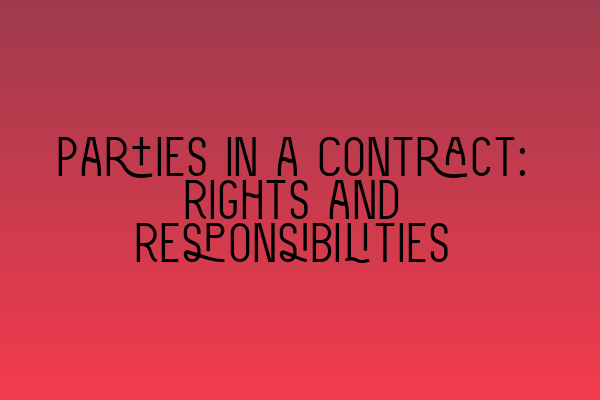Parties in a Contract: Rights and Responsibilities
Contracts are the foundation of business relationships, ensuring that both parties are protected and held accountable for their obligations. Whether you are a solicitor, business owner, or an individual entering into a contractual agreement, understanding the rights and responsibilities of each party is crucial. In this article, we will explore the key aspects of parties in a contract, highlighting their rights and obligations.
1. The Parties Involved in a Contract
Before delving into the rights and responsibilities, let’s first identify the parties typically involved in a contract. A contract involves at least two parties: the offeror and the offeree. The offeror is the party making the offer, while the offeree is the party receiving the offer.
Additionally, a contract may involve other parties such as shareholders, directors, contractors, or suppliers. These parties may not be involved in the formation of the contract but may have rights and responsibilities outlined within it.
2. Rights of the Parties in a Contract
When it comes to contractual rights, the parties involved have several important entitlements that must be recognized and protected. Here are some key rights enjoyed by the parties:
a. Right to Enforce the Contract
Once a contract is validly formed, all parties have the right to enforce its terms and conditions. This means that if one party fails to fulfill its obligations, the other party can seek legal remedies to ensure compliance.
b. Right to Performance
Each party has the right to expect the other party to fulfill their obligations as outlined in the contract. This includes the timely delivery of goods or services, proper payment, or any other agreed-upon terms.
c. Right to Terminate the Contract
In certain situations, where the other party has breached the terms of the contract, parties may have the right to terminate the agreement. Termination rights should be clearly defined in the contract to avoid any ambiguity or disputes.
d. Right to Seek Damages
If one party fails to fulfill their obligations, the other party has the right to seek damages for any losses suffered as a result of the breach. This could include financial compensation for direct losses, consequential damages, or specific performance.
3. Responsibilities of the Parties in a Contract
Just as parties have rights, they also have responsibilities to uphold within a contractual relationship. Understanding and fulfilling these responsibilities is essential for a successful contract. Here are some key responsibilities of the parties involved:
a. Duty to Perform
Each party has a duty to perform their obligations as outlined in the contract. This means completing tasks, delivering goods or services, or making payments within the specified timeframes and according to the agreed-upon terms.
b. Duty of Good Faith and Fair Dealing
All parties have a duty of good faith and fair dealing in their contractual relationship. This means acting honestly, fairly, and in a manner that upholds the purpose and intention of the contract. Parties should not act in a way that would undermine or interfere with the other party’s rights or the contract itself.
c. Duty to Communicate
Effective communication is crucial in a contractual relationship. Parties have a responsibility to promptly communicate any changes, issues, or concerns that may affect the performance or validity of the contract. This includes notifying the other party of any delays, disputes, or breaches.
d. Duty to Mitigate Damages
If one party believes that the other party has breached the contract, they have a duty to mitigate their damages. This means taking reasonable steps to minimize the potential losses resulting from the breach.
4. Conclusion
Contracts are the backbone of business transactions, establishing the rights and responsibilities of the parties involved. Understanding these rights and responsibilities is crucial for a successful contractual relationship and can help mitigate disputes and liabilities. By recognizing the parties involved, their rights, and their responsibilities, you can create and enforce a contract that protects all parties involved.
For further guidance on related topics, we recommend reading the following articles:
- LLC Formation Made Simple: Step-by-Step Guide for UK Entrepreneurs
- SQE Workshops and Webinars: Accelerate Your Exam Preparation
- Delaware Corporate Law for UK Solicitors: Key Insights and Practices
- Leveraging Cross-border Legal Services: A Strategic Guide
- Complying with Legal Obligations: Delaware LLCs in the UK
